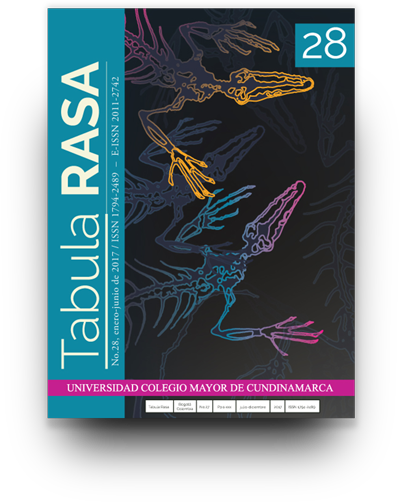When lions write history : Walter Rodney’s black Marxism.
Cuando los leones hacen la historia : el marxismo negro de Walter Rodney.
Show authors biography
What are the whereabouts of Walter Rodney? Who remembers him? One of the brightest minds in the Caribbean, the historian who talked to the exploited and the oppressed, the anticolonial nationalist militant, the speaker of the Caribbean Black Power, the socialist Pan-Africanist, the black Marxist, one of the last black radicals in the Caribbean, along with Tim Hector. This paper intends to be an introduction to the Guyanese historian and political activist. This work is made up of four sections: a biographical introduction, and three moments in which we may observe how he conceived teaching and history as tools for African freedom and their diaspora. As we account for Rodney’s theoretical and political movements departing from his original notion of Marxism and his dialectic use of the notions of class/race in three contexts: Jamaica, Tanzania, and Guyana, this work primarily aims at showing the monumental legacy of a Caribbean radical and the currency of a number of formulations of his as a guide to think and act nowadays.
Article visits 248 | PDF visits 138
Downloads
- Austin, D. (2001). Introduction to Walter Rodney. Small Axe. A Caribbean Journal of Criticism, 10(5), 60-65.
- Adeleke, T. (2017). Africa in black liberation activism. Malcolm X, Stockely Carmichael and Walter Rodney. New York: Routledge.
- Bly, V.M. (1985). Walter Rodney and Africa. Journal of Black Studies, 16(2), 115-130.
- Bogues, A. (2009). Black Power, Decolonization, and Caribbean Politics: Walter Rodney and the Politics of the Groundings with My Brothers. Boundary, 2(39), 127147.
- Campbell, H. (2016). Rasta y resistencia: de Marcus Garvey a Walter Rodney. Santiago de Cuba: Editorial Oriente.
- Carmichael, S & Hamilton, C. (1967). Poder negro. México: Siglo XXI editores.
- Buhle, P. (2013). Memories of the Afro-Caribbean Left [Reseña del libro Walter A. Rodney: A Promise of Revolution]. Monthly Review, an independent socialist magazine (April), 64(11), 60-62.
- Devés Valdés, E. (2007). Kwame Nkruma: panafricanismo, neocolonialismo y consciencismo. Seminario de Investigación Interdisciplinaria. Facultad de Estudios Generales, Universidad de Puerto Rico, Recinto Río Piedras. Ciclo de conferencias Cuatro figuras del pensamiento africano del siglo XX: propuestas para una sociedad regional y mundial. Febrero - mayo 2007. Recuperado de: http://www.papelesdesociedad.info/IMG/pdf/kwame_nkrumah.pdf
- Dupuy, A. (1996). Race and Class in the Postcolonial Caribbean: fte Views of Walter Rodney. Latin American Perspectives, 23, 107-129.
- Girvan, N. (2005). El pensamiento de la dependencia en el Caribe Anglófono. RMC, 19, 7-55.
- Hill, R.A. (1983). Walter Rodney on Pan-Africanism. Ufahamu: A Journal of African Studies, 12, 14-35.
- Hinds, D. (1988). Walter Rodney and Political Resistance in Guyana: fte 1979-1980 Civil Rebellion. Wadabagei, 11, 36-63.
- Hirji, K.F. (2017). The enduring relevance of Walter Rodney’s How Europe Underdeveloped Africa. Dar es Saalam: Daraja Press.
- James, C.L.R. (1982). Walter Rodney and the Question of Power. En E.A. Alpers, P.M. Fontaine (eds.), Walter Rodney, revolutionary and scholar: A tribute (pp. 133-146). Los Angeles: University of California.
- Ledgister, F.S.J. (2008). ‘Intellectual Murder’: Walter Rodney’s Groundings in the Jamaican Context. Commonwealth & Comparative Politics, 46(1), 79-100.
- Lewis, R.Ch. (1994). Walter Rodney revisited. Social and Economic Studies. 43(3), 7-56.
- Lewis, R.Ch. (1998). Walter Rodney’s intellectual and political thought. Barbados: Press University of the West Indies.
- Lewis, R.Ch. (2008). Jamaican Black Power in the 1960s. En K. Quinn (ed.). Black Power in the Caribbean (pp. 53-75). Florida: University Press of Florida.
- Pierre-Charles, G. (1985). El pensamiento sociopolítico moderno en el Caribe. México: Fondo de Cultura Económica.
- Quinn, K. (2008). Black Power in Caribbean Context. En K. Quinn (ed.). Black Power in the Caribbean (pp. 25-51). Florida: University Press of Florida.
- Reddock, R. (2014). Radical Caribbean social thought: Race, class identity and the postcolonial nation. Current Sociology, 62(4), 1-19.
- Renton, D. (2004). Dissident marxism. Past voices for present times. London: Zed Books.
- Rodney, W. (1974). Aspects of the International Class Struggle in Africa, the Caribbean and America. En H. Campbell (ed). Pan-Africanism: Struggle against Neo-colonialism and Imperialism. Documents of the Sixth Pan-African Congress (pp. 18-41) Toronto: Afro- Carib Publications.
- Rodney, W. (1975). Marxism and African Liberation. Yes to Marxism! People’s Progressive Party, Georgetown, Guyana, 1986. Recuperado de: https://www.marxists.org/subject/africa/rodney-walter/works/marxismandafrica.htm
- Rodney, W. (1980). Class on Contradiction in Tanzania. En H. Othman (ed.). The State in Tanzania: A Selection of Articles (pp. 18-41). Dar es Salaam: Dar es Salaam University Press. Recuperado en: https://www.marxists.org/subject/africa/rodney-walter/works/classcontradictions.htm
- Rodney, W. (1979). People´s power. No dictator. Georgetown, Guyana: Working People’s Alliance, 1979. Recuperado en: https://www.marxists.org/subject/africa/rodney-walter/works/peoplespowernodictator.htm
- Rodney, W. (1981). fte African Revolution. A talk at the University of Michigan, 31 March 1972, published in Urgent Tasks [Sojourner Truth Organization, Chicago] 12 (1981), 5-13. Recuperado en: https://www.marxists.org/subject/africa/rodney-walter/works/africanrevolution.htm
- Rodney, W. (2001). African History in the Service of the Black Liberation. Small Axe. A Caribbean Journal of Criticism, 5(2), 66-80.
- Rodney, W. (2001a [1969]). The Groundings with my Brothers. Chicago: Frontline Books.
- Rodney, W. (2017 [1969]). El Black Power. Su relevancia en el Caribe. En F. Valdés García (Coord.), Antología del pensamiento crítico contemporáneo West Indies, Antillas Francesas y Antillas Holandesas. (pp. 201-212). Buenos Aires: Clacso.
- Shankar, G. (1999). Where the present is haunted by the past. Disartigulating Colonialism’s Legacy in the Caribbean. Cultural Dynamics, 11(1), 57-87.
- ftomas, CY. (1982). Walter Rodney and the Caribbean Revolution. En E.A. Alpers, P.M. Fontaine (eds.), Walter Rodney, revolutionary and scholar. A tribute (pp. 119-132). Los Angeles: University of California.
- West, M.O. (2008). Seeing Darkly: Guyana, Black Power, and Walter Rodney’s Expulsion from Jamaica. Small Axe: A Caribbean Journal of Criticism, 12(1), 93-104.
- Young, K.B. (2008). Walter Rodney’s Pan-African Nationalism. Peace Review, 20, 487- 495.




